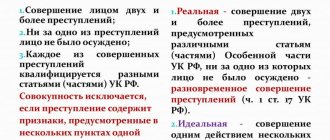1. Recidivism of crimes is the commission of an intentional crime by a person who has a criminal record for a previously committed intentional crime.
2. Recidivism of crimes is considered dangerous:
a) when a person commits a serious crime for which he is sentenced to actual imprisonment, if earlier this person was sentenced to imprisonment two or more times for an intentional crime of average gravity;
b) when a person commits a serious crime, if he was previously convicted of a serious or especially serious crime to actual imprisonment.
3. Recidivism of crimes is considered especially dangerous:
a) when a person commits a serious crime for which he is sentenced to real imprisonment, if previously this person was twice sentenced to real imprisonment for a serious crime;
b) when a person commits a particularly serious crime, if he has previously been convicted of a serious crime twice or has previously been convicted of a particularly serious crime.
4. When recognizing a recidivism of crimes, the following are not taken into account:
a) convictions for intentional crimes of minor gravity;
b) convictions for crimes committed by a person under the age of eighteen;
c) convictions for crimes for which the conviction was deemed suspended or for which a deferment of execution of the sentence was granted, if the conditional conviction or deferment of execution of the sentence was not canceled and the person was not sent to serve the sentence in prison, as well as convictions expunged or expunged in accordance with the procedure, established by article of this Code.
5. Recidivism of crimes entails a more severe punishment on the basis and within the limits provided for by this Code, as well as other consequences provided for by the legislation of the Russian Federation.
- Article 17. Set of crimes
- Article 19. General conditions of criminal liability
The concept and signs of recidivism
The term "relapse" means "the reappearance of something."
Recidivism of crimes, along with the real totality (Part 1 of Article 17 of the Criminal Code of the Russian Federation) is a type of multiplicity.
Recidivism is the most dangerous form of multiple crimes, since a second criminal act is committed after the fact of conviction for the first crime.
Recidivism of crimes is the commission of an intentional crime by a person who has a criminal record for a previously committed intentional crime (Part 1 of Article 18 of the Criminal Code of the Russian Federation).
From this definition it is clear that relapse has the following characteristics :
- commission of two or more intentional crimes by a person;
- having a criminal record for a previous crime.
Thus, relapse as a type of plurality is characterized by the fact that a person convicted of an intentional crime, before expunging or removing the criminal record, commits an intentional crime again. Recidivism in the criminal legal sense cannot occur through the repetition of careless crimes. An indication of the intentional form of guilt of two (or more) crimes specifies the concept of recidivism and excludes the possibility of recognizing a person as a recidivist if he commits a careless crime or has a criminal record for a careless crime.
Distinguishing recidivism from the totality of crimes
The presence of at least one conviction for a previously committed crime as a mandatory sign of recidivism makes it possible to distinguish recidivism from the totality of crimes. If a relapse is recognized in accordance with Part 4 of Art. 18 of the Criminal Code of the Russian Federation are not taken into account :
- convictions for intentional crimes of minor gravity . If a person who has a conviction for a minor crime commits an intentional crime again, there is no recidivism. At the same time, if a person has a criminal record for committing an intentional crime of a different category and again commits an intentional crime of even minor gravity, his actions constitute a recidivism.
- convictions for crimes for which the conviction was recognized as suspended or for which a deferment of execution of the sentence was granted, if the conditional conviction or deferment of the sentence was not canceled and the person was not sent to serve the sentence in a prison. When recognizing the recidivism of crimes, the criminal records of persons who were given a suspended sentence or who were granted a deferment of execution of the sentence are also not taken into account if the punishment assigned to them was more lenient than imprisonment, regardless of whether the suspended sentence or deferment was canceled, since in this case they were not sent for serving a sentence in a prison. If the conditional sentence or deferment was canceled due to the commission of a new crime (Part 5 of Article 74, Part 4 of Article 82 of the Criminal Code of the Russian Federation), and the convicted person (convicted woman) was sentenced to imprisonment based on the totality of sentences, then in this case there is no relapse of crimes.
- convictions for crimes committed by a person under the age of 18 (for example, a conviction that arose after the person reached the age of 18 is not subject to consideration for determining recidivism if the person was convicted of a crime committed before reaching the age of majority).
- convictions removed or expunged in the manner prescribed by Art. 86 of the Criminal Code of the Russian Federation (expunged or expunged criminal records cannot be taken into account when deciding the issue of recidivism, since they do not legally exist. The presence of relapse is associated with an outstanding criminal record precisely at the time of the commission of the crime, and not at the time of the imposition of any sanctions against the person who committed the crime investigative or judicial procedural decisions).
Commentary to Art. 18 of the Criminal Code of the Russian Federation
Recidivism of crimes is the second type of multiplicity of crimes in accordance with current legislation. This is a more dangerous type of plurality compared to aggregation of crimes, since it is formed as a result of the commission of a new intentional crime by a person who has a conviction for a previously committed intentional crime, i.e. due to the commission of a new crime, despite the already applied criminal law measures.
The concept of “relapse” means “repeated manifestation of something.”
———————————
See: Ozhegov S.I. Explanatory dictionary of the Russian language. M., 1996. P. 667.
The legislator defines the recurrence of crimes as the repeated commission or repetition of a crime under the circumstances specified in the law.
When establishing the recidivism of crimes, their stages (completed or unfinished) and types of complicity (perpetrator, organizer, accomplice, instigator) do not matter.
It should be noted that the Criminal Code of the RSFSR of 1960 introduced the concept of a particularly dangerous recidivist. This circumstance was a characteristic of the personality of the perpetrator and entailed negative legal consequences in the event of a new crime being committed. With the adoption of the Criminal Code of the Russian Federation in 1996, the concept of “recidivist” was excluded, and the concept of “recidivism” began to be used instead. Thus, the repetition of a crime (relapse) formally lost its personal aspect, but became a characteristic of the act. But just like the earlier concept of a particularly dangerous recidivist, the concept of recidivism under current legislation is associated with negative legal consequences. As a general rule, relapse of crimes is associated with the application of more stringent criminal legal measures to the perpetrator.
In this regard, in theory and practice, the question of the constitutionality of the provisions of Art. 18 of the Criminal Code of the Russian Federation, since taking into account recidivism when resolving criminal legal issues means repeated imposition of criminal liability for the same crime, which is expressed in increased punishment due to the fact that a person has an outstanding or unexpunged criminal record.
Having considered this issue, the Constitutional Court of the Russian Federation, in Resolution No. 3-P of March 19, 2003, recognized the provisions of Art. 18 of the Criminal Code of the Russian Federation corresponding to the Constitution of the Russian Federation. At the same time, it was noted that the principle of non bis in idem, as established by the Constitution of the Russian Federation and regulated by the criminal legislation of the Russian Federation, does not interfere with both the federal legislator by securing a criminal record and related institutions of repetition and recidivism of crimes entailing legal consequences provided for by the criminal law, and the court, in the process of determining in the prescribed manner the type and measure of punishment applied to a person who has committed a crime, must take into account the nature of the crime, its danger to the values protected by the Constitution of the Russian Federation and criminal law, the intensity, reasons and other circumstances of its commission, as well as data on person who has committed a crime, provided that the regulation of these institutions and their application are adequate to the constitutional principles of legal responsibility and guarantees of the individual in his public legal relations with the state.
On the contrary, the constitutional prohibition of discrimination and the principles of justice and humanism expressed in the Constitution of the Russian Federation would be contrary to the legislative establishment of criminal liability and punishment without taking into account the identity of the perpetrator and other circumstances that have an objective and reasonable justification and contribute to an adequate assessment of the social danger of both the criminal act itself and the person who committed it. crime of a person, and the application of identical measures of responsibility for crimes of different degrees of social danger without taking into account the intensity of participation of a particular person in a crime, his behavior after the commission of a crime and after serving a sentence, if one has already been imposed previously, and other circumstances characterizing the individual.
The presence in criminal legislation of various forms of taking into account previous convictions when determining a person’s responsibility for a newly committed crime, including in case of recidivism of crimes, in any case, does not mean the possibility of double accounting of the same circumstances simultaneously both when classifying crimes and when imposing punishment , since otherwise would contradict the constitutional principle of equality of all before the law and the court in the sphere of criminal legal relations.
The criminal legal consequences of a previous conviction provided for by the Criminal Code of the Russian Federation when convicting a guilty person for committing a new crime do not go beyond the scope of criminal legal means that the federal legislator has the right to use to achieve the constitutionally justified goals of differentiating criminal liability and punishment, strengthening its corrective impact on the convicted person, and preventing new crimes and thereby protect the individual, society and the state from criminal attacks.
———————————
NW RF. 2003. N 14. Art. 1302. See also the special opinion of the judge of the Constitutional Court of the Russian Federation N.V. Vitruka.
In Part 1 of Art. 18 of the Criminal Code of the Russian Federation defines recidivism as the commission of an intentional crime by a person who has a criminal record for a previously committed intentional crime.
This definition allows us to identify specific features characteristic of recidivism.
The first of them is the presence of a new only intentional crime and the presence of a criminal record solely for an intentional crime. Such crimes also include crimes committed with two forms of guilt, since in accordance with Art. 27 of the Criminal Code of the Russian Federation in general, such crimes are recognized as committed intentionally. Thus, we can say that recidivism of crimes is formed only by intentional crimes. Committing a new crime through negligence or having a criminal record for a crime committed through negligence excludes the possibility of recidivism.
The second characteristic feature of recidivism is the presence of a conviction for an intentional crime at the time of committing a new intentional crime. In this regard, there will be no relapse of crimes if a new crime is committed by a person released from serving a sentence, or a person in respect of whom the criminal record has been expunged or removed. However, it should be borne in mind that the expiration period for a criminal record is calculated separately for each crime. Therefore, if a person who has a conviction for an intentional crime of moderate gravity and a serious crime commits a new intentional crime after the expiration of the conviction for a moderate crime, he has a conviction for a serious crime. However, when determining the type of recidivism of a crime, an expunged conviction for a crime of medium gravity will no longer be taken into account, since the expungement or expungement of a criminal record cancels all legal consequences associated with a criminal record.
When deciding whether to have a criminal record, you should pay attention to the fact that there is no legally established possibility of taking into account a criminal record when convicting a person on the territory of a foreign state. Therefore, such convictions cannot be taken into account when determining recidivism.
The legislator uses three criteria to determine the types of recidivism.
The first of these is the category of crime: the category of a new intentional crime and the category of a crime for which there is a criminal record.
The second criterion is the number of convictions. In the law, the quantitative criterion is designated as the number of convictions, but in fact it means the number of convictions, since when determining recidivism, only those convictions for which the conviction is retained are taken into account.
The third criterion used in determining dangerous and especially dangerous recidivism of crimes is the fact of being sentenced to actual imprisonment. The concept of real deprivation of liberty is not disclosed in the law, but it means that, by a court verdict, the convicted person must serve a sentence of imprisonment. The type of institution appointed for serving this type of punishment, the type of punishment itself in the form of imprisonment (imprisonment for a certain period or life imprisonment) do not matter for the existence of a conviction to actual imprisonment. But this will be absent in cases where the imposed punishment is not subject to actual execution, but must be executed in the presence of conditions specified in the law, for example, with a suspended sentence, with a deferment of serving the sentence, or when a different punishment is imposed instead of imprisonment, for example, when assigned to in accordance with Part 2 of Art. 55 of the Criminal Code of the Russian Federation, instead of imprisonment, punishment in the form of detention in a disciplinary military unit. Under other circumstances that make it impossible to carry out the imposed imprisonment, for example, when the term of this punishment is assigned within the period of detention, the fact of being sentenced to actual imprisonment will take place.
Various combinations of these three criteria allowed the legislator to determine the following types of recidivism: simple, dangerous and especially dangerous recidivism.
The concept of simple recidivism is used in law, but is applied in practice. Its content is the general concept of relapse (Part 1 of Article 18 of the Criminal Code of the Russian Federation).
Recidivism of crimes is considered dangerous:
a) when a person commits a serious crime for which he is sentenced to actual imprisonment, if earlier this person was sentenced to imprisonment two or more times for an intentional crime of average gravity;
b) when a person commits a serious crime, if he was previously convicted of a serious or especially serious crime to actual imprisonment.
Recidivism of crimes is considered especially dangerous:
a) when a person commits a serious crime for which he is sentenced to real imprisonment, if previously this person was twice sentenced to real imprisonment for a serious crime;
b) when a person commits a particularly serious crime, if he has previously been convicted of a serious crime twice or has previously been convicted of a particularly serious crime.
The legislative definition of the types of recidivism of crimes is an exhaustive combination of criteria that makes it possible to divide recidivism into types. Formally, if any combination does not fall under the criteria of a dangerous or especially dangerous relapse, the relapse should be recognized as simple.
Thus, in accordance with the law, dangerous or especially dangerous recidivism does not include cases where a person has committed a particularly serious crime, having previously been convicted of a serious crime once. In this situation, if you follow only the letter of the law, recidivism should be recognized as simple, which in a number of cases was realized in judicial practice. But the general trend in resolving this issue, based on compliance with the principle of fairness, was different, and in this regard, the Presidium of the Supreme Court of the Russian Federation, in Resolution No. 464p06 of January 31, 2007, indicated that “in accordance with the provisions of clause “b”, part 2 Art. 18 of the Criminal Code of the Russian Federation (as amended by Federal Law of December 8, 2003 N 162-FZ) when a person commits a particularly serious crime, if he was previously convicted of a serious crime to actual imprisonment, the relapse of crimes is considered dangerous.”
Apparently, using a similar systematic approach, the issue of the type of recidivism should be resolved in the case when a person commits a particularly serious crime, if he has been convicted two or more times for crimes of moderate gravity. At the same time, a clearer solution to these issues is necessary at the legal level, which will eliminate the possibility of unequal solutions to problems such as recidivism of crimes.
In Part 4 of Art. 18 of the Criminal Code of the Russian Federation establishes a closed list of criminal records that are not taken into account when determining recidivism.
Thus, in this case, convictions for crimes of minor gravity are not subject to recording. Therefore, if a person who has a conviction for such a crime commits an intentional crime again, there is no relapse. At the same time, if a person has a criminal record for committing an intentional crime of a different category and again commits an intentional crime of even minor gravity, his actions constitute a recidivism.
When recognizing a recidivism, convictions for crimes committed by a person under the age of eighteen are also not taken into account. This legal requirement is absolute, regardless of the number of convictions and categories of crimes. In this case, the moment of occurrence of a criminal record must be correlated with the moment of commission of the crime. Therefore, for example, a criminal record that arose after a person reached the age of 18 is not subject to consideration for determining recidivism if the person was convicted of a crime committed before reaching the age of majority.
When committing ongoing and ongoing crimes, criminal records will be important to determine recidivism in cases where the end of the crime occurred after reaching the age of majority, regardless of the fact that the crime was started as a minor.
And finally, when recognizing the recidivism of crimes, convictions for crimes for which the conviction was recognized as suspended or for which a deferment of execution of the sentence was granted are not taken into account, if the suspended sentence or deferment of the sentence was not canceled and the person was not sent to serve the sentence in prison, and also, as noted above, criminal records expunged or expunged in the manner prescribed by Art. 86 of the Criminal Code of the Russian Federation.
In Part 4 of Art. 18 of the Criminal Code of the Russian Federation uses the concept of “deferment of execution of a sentence”. This concept is not used further in the Criminal Code of the Russian Federation. In relation to the grounds for deferment, the criminal law establishes the possibility of deferring the serving of sentences for pregnant women and women with young children (Article 82 of the Criminal Code of the Russian Federation). However, the Criminal Procedure Code of the Russian Federation (Code of Criminal Procedure of the Russian Federation) (Article 398) establishes a broader list of grounds for deferring the execution of a sentence, which includes the above-mentioned ground. In this regard, formally, criminal records for which a deferment of execution of the sentence was granted, for example, on such grounds as the illness of the convict that prevents the serving of the sentence, grave consequences or the threat of their occurrence for the convict or his close relatives caused by a fire, are not subject to formal consideration when recognizing the recidivism of crimes. or another natural disaster, serious illness or death of the only able-bodied family member, or other exceptional circumstances.
In Part 5 of Art. 18 of the Criminal Code of the Russian Federation establishes a general provision according to which recidivism of crimes entails a more severe punishment on the basis and within the limits provided for by the Criminal Code of the Russian Federation. This provision is implemented in other provisions of the Criminal Code of the Russian Federation, for example in Art. 68, which establishes the rules for assigning punishment for repeat crimes.
Types of relapse
Article 18 of the Criminal Code of the Russian Federation provides for three types of relapse :
1) simple; 2) dangerous; 3) especially dangerous.
The criteria for such differentiation are the categories of crimes, the number of convictions and the type of punishment. It should be noted that the more dangerous the crime, the fewer convictions are required to recognize a recidivism as dangerous or especially dangerous.
Simple relapse
In case of a simple recidivism, a person who has a conviction for an intentional crime again commits an intentional crime of any category, except for those that characterize a dangerous or especially dangerous recidivism.
Dangerous relapse
Dangerous relapse is provided for in Part 2 of Art. 18 of the Criminal Code of the Russian Federation. A dangerous relapse has two types. They are based on various criteria: mandatory sentencing to real imprisonment for crimes committed or a certain category of crimes committed, the number of previous convictions.
The law establishes two grounds for recognizing a relapse as dangerous:
1) when a person commits a serious crime for which he is sentenced to actual imprisonment, if earlier this person was sentenced to imprisonment two or more times for an intentional crime of moderate gravity. When identifying this type of dangerous recidivism, the legislator proceeded from the number of previous convictions (at least two), the category of crimes and the type of punishment. In this case, previously committed crimes must be of medium gravity, and newly committed ones must be serious. The terms of imprisonment assigned both for the first crimes and for the newly committed act do not affect the determination of the type of recidivism; however, it must be borne in mind that a suspended sentence of imprisonment excludes relapse;
2) when a person commits a serious crime, if he was previously convicted of a serious or especially serious crime to actual imprisonment. In this case, the category of crime (serious or especially serious) is taken as a basis and the number of repetitions of the assault is reduced to a minimum. As with the first type of dangerous recidivism, the presence of this variant presupposes the conviction of the perpetrator to punishment in the form of actual imprisonment.
Particularly dangerous relapse
When determining this type of recidivism, the legislator uses different criteria: the number of convictions, type of punishment and categories of crimes.
Recidivism of crimes is considered especially dangerous:
1) when a person commits a serious crime for which he is sentenced to actual imprisonment, if previously this person was twice sentenced to actual imprisonment for a serious crime;
2) when a person commits a particularly serious crime, if he was previously convicted of a serious crime twice or was previously convicted of a particularly serious crime (Part 3 of Article 18 of the Criminal Code).
Legal consequences of recidivism
All of these types of recidivism, according to Part 5 of Article 18 of the Criminal Code of the Russian Federation, entail the following negative legal consequences:
More severe punishment . Recidivism of crimes entails a more severe punishment on the basis and within the limits provided for by the Criminal Code of the Russian Federation (clause “a”, part 1, article 63 of the Criminal Code of the Russian Federation, article 68 of the Criminal Code of the Russian Federation). Thus, Article 63 of the Criminal Code of the Russian Federation classifies relapse as aggravating circumstances. The Plenum of the Supreme Court of the Russian Federation has repeatedly drawn the attention of the courts to the fact that the unreasonable imposition of lenient penalties on persons with previous convictions is unacceptable.
The procedure for imposing punishment . The term of punishment for any type of recidivism of crimes cannot be less than 1/3 of the maximum term of the most severe type of punishment provided for the crime committed, but within the sanction of the relevant article of the Special Part of the Criminal Code. In the presence of mitigating circumstances provided for in Art. 61 of the Criminal Code of the Russian Federation, the sentence may be assigned less than 1/3 of the maximum term of the most severe type of punishment provided for the crime committed, but within the sanction of the relevant article of the Special Part, and in the presence of exceptional circumstances specified in Art. 64 of the Criminal Code of the Russian Federation - and a more lenient punishment than provided for this crime (Article 68 of the Criminal Code of the Russian Federation).
Maximum sentence . In case of relapse in accordance with Art. 70 of the Criminal Code of the Russian Federation, it is possible to impose a sentence of imprisonment for a term of up to 30 years.
Type of correctional institution . Recidivism of crimes affects the purpose of the type of correctional institution (Article 58 of the Criminal Code of the Russian Federation). Convicted men who have previously served imprisonment, in case of a simple or dangerous recidivism of crimes, are assigned to serve imprisonment in high-security correctional colonies, and in case of a particularly dangerous recidivism, men serve their sentence in special-regime correctional colonies, and they may be assigned to serve part of the sentence in prison .
Features of sentencing
The imposition of punishment for the recurrence of a crime of any kind must take into account the features described in Art. 68 of the Criminal Code of the Russian Federation:
- what offense was committed and how dangerous it is for society applies to both the new offense and the previous one;
- conditions that contributed to the poor outcome of previously applied corrective measures;
- according to Part 3 of Art. 68 of the Criminal Code of the Russian Federation, the existence of mitigating or exceptional factors.
When considering the totality of facts, an understanding is formed of how strongly a person strives to commit illegal actions and how fruitful the corrective influence already exerted on him is.
This means that when the defendant commits an offense that is less serious or not as dangerous as the previous one, some, albeit insufficient, correction is expected.
If the repeated offense is more serious and dangerous, the opinion arises that the corrective measures taken did not produce any results and the person continues to develop a desire to commit acts that violate the law. This usually results in increased punishment.
The court evaluates where the previous sentence was served and how, the reasons explaining the poor outcome of the correctional institution.








